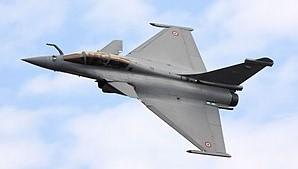Rafale Deal: Indian Negotiating Team was ‘Internally Divided’

Image Courtesy: Wikipedia
In its reply to the Supreme Court, while defending the procedure adopted to clinch the 36 Rafale aircraft deal, did the Narendra Modi government not disclose the fact that there were certain “internal disagreements” within the seven-member Indian Negotiating Team (INT)?
As per the information accessed by The Caravan magazine, published in its latest issue, there were several differences within the INT, related to pricing and national interest. However, “the government, while defending the procedure behind the Rafale deal before the Supreme Court, concealed these internal disagreements from its submissions, which stated that the negotiating team followed “a collegiate process”, says The Caravan.
According to the magazine, some “dissenting” members of the INT had raised their reservations about 10 issues related to the deal while talks were on with the French side.
The magazine, which said it relied on “information” accessed by it, listed one key issue on which there were differences among the INT members as the pricing of the deal.
The initial benchmark price for the 36 jets was set at €5.2 billion—more than €2.5 billion below the value of the final deal signed in 2016.
“The initial price was calculated by MP Singh, the official in the team tasked with advising it on cost. Two other members of the team supported Singh’s calculation: Rajeev Verma, the joint secretary and acquisition manager (air), and Anil Sule, the finance manager (air). Of the team’s seven members, Singh, Verma and Sule had the most expertise in issues related to pricing. The team’s four other members opposed the initial price, saying it was unviable. These four members included the head of the team—the deputy chief of air staff, Rakesh Kumar Singh Bhadauria”.
The pricing issue was thereafter sent to Defence Acquisition Council, headed by the Defence Minister, which “proposed an alternative calculation resulting in a higher benchmark price, that used methods in conflict with the Defence Procurement Procedure-2013, the procurement rules that govern the Rafale deal”, the report said, adding that the DAC passed the revised figure on to the PM-headed Cabinet Committee on Security to take a final call.
“The CCS, under Narendra Modi, authorised the higher benchmark price, even though it does not have the expertise to settle technical issues such as pricing,” said the report.
According to The Caravan, the INT’s other internal disagreements followed a “similar trajectory”, as in Singh, Verma and Sule raised points of dissent, and were opposed by Bhadauria and the team’s other members. “However, the CCS cleared the Rafale deal despite the outstanding objections of the negotiating officers,” it said.
The article goes on to list the 10 issues that invited dissent by the three members of the INT.
- The new price, at over €2.5 billion higher than the one first suggested by Singh, was unreasonably high.
- No Advance & Performance Bank Guarantee has been obtained from Dassault Aviation and the advance payments made prior to delivery are not secured
- The delivery schedule of 36 Rafale IGA was not better than that of 126 MMRCA bid.
- The Maintenance Terms and Conditions including PBG (Performance Based Guarantee) of 36 Rafale IGA was not better than that of 126 MMRCA bid.
- The IGA Clauses and Articles of the Aircraft and Weapon Supply Protocols be aligned/ modified with the recommendations of Ministry of Law & Justice (MOLJ)
- The 20% discount offer of EADS in 126 MMRCA tender was ignored. The INT should take EADS quote for 36 Rafale delivery equivalent and then compare prices.
- The cost of India Specific Enhancement (ISE) was too high.
- Dassault will not be able to [unclear word] the deliveries as per IGA due to its ongoing contracts with French forces, Egypt and [Qatar].
- Dassault’s financial position is not sound as per its published financial results. So, it may not be able to deliver the 36 Rafale aircraft
- As per the prices reflected in Dassault’s financial results, it has sold Rafale at a cheaper rate to Qatar and Egypt as compared to India.
The question, therefore, is: Did the government disclose the objections raised by the “dissenting officers” in its reply to the apex court? If not, then the process of clinching of the 36 aircraft Rafale deal by the Modi government, will continue to raise more stink, more so as the Opposition steps up pressure on the government to form a Joint Parliamentary Committee to probe the issue.
Get the latest reports & analysis with people's perspective on Protests, movements & deep analytical videos, discussions of the current affairs in your Telegram app. Subscribe to NewsClick's Telegram channel & get Real-Time updates on stories, as they get published on our website.
























